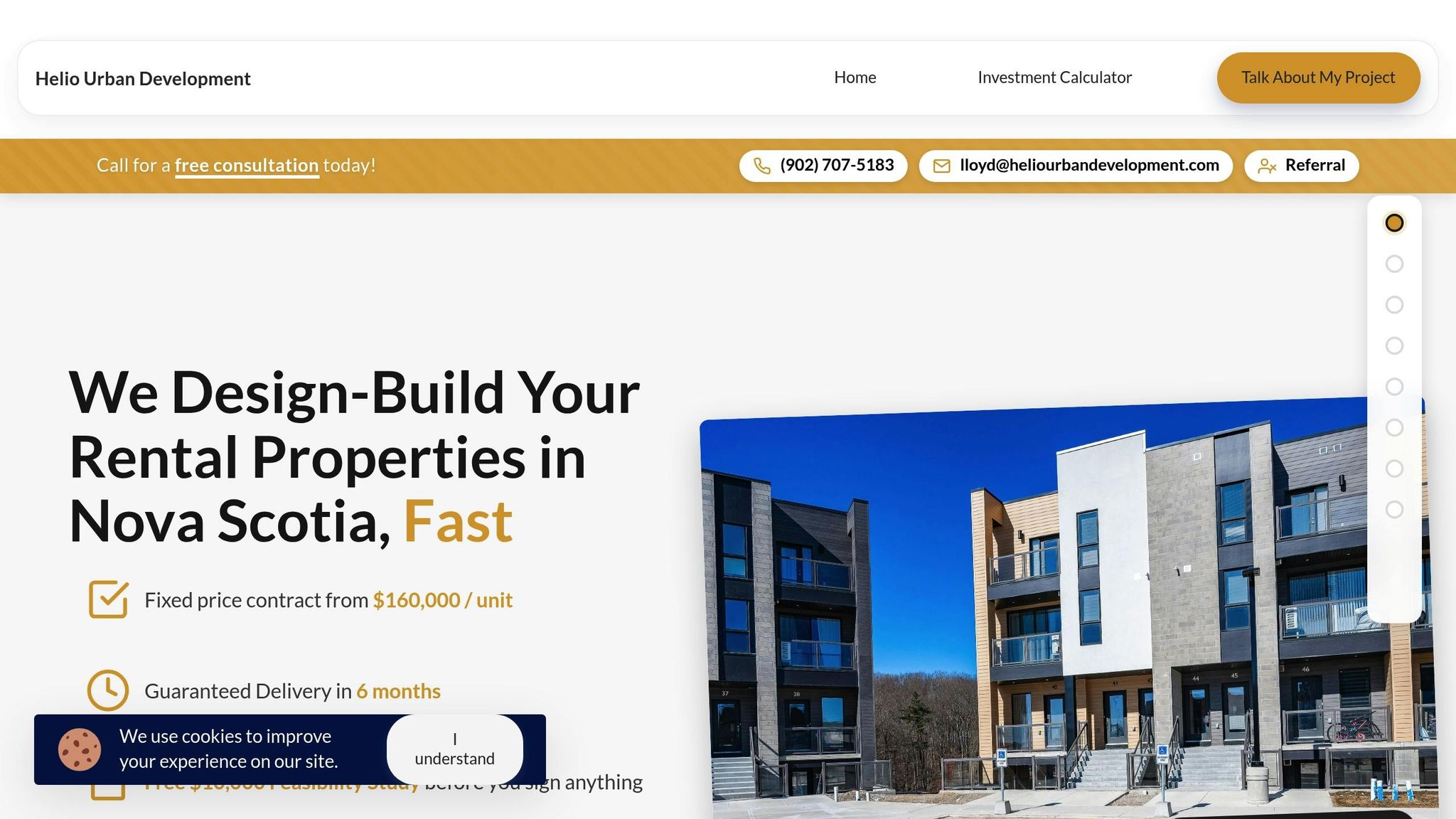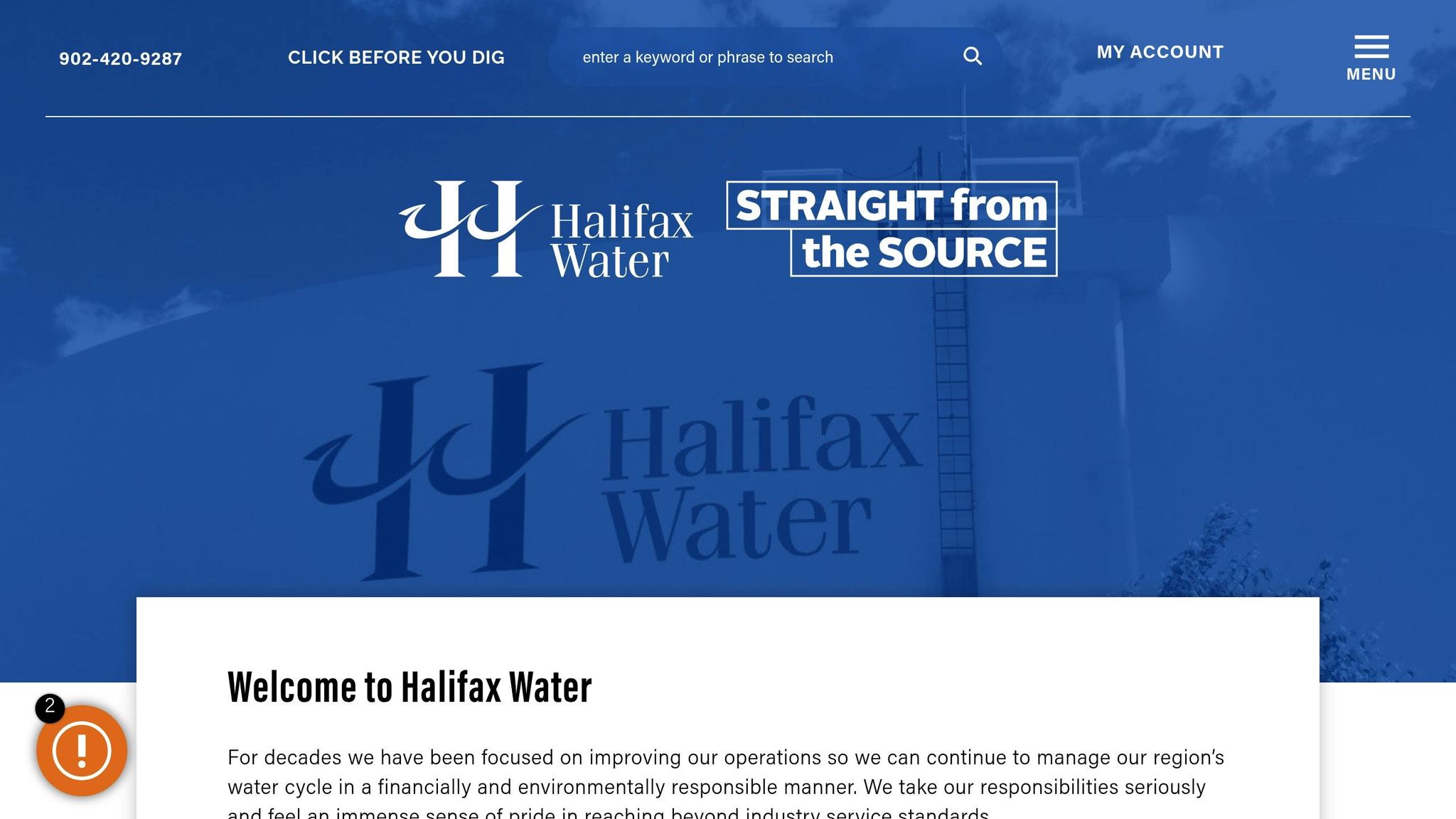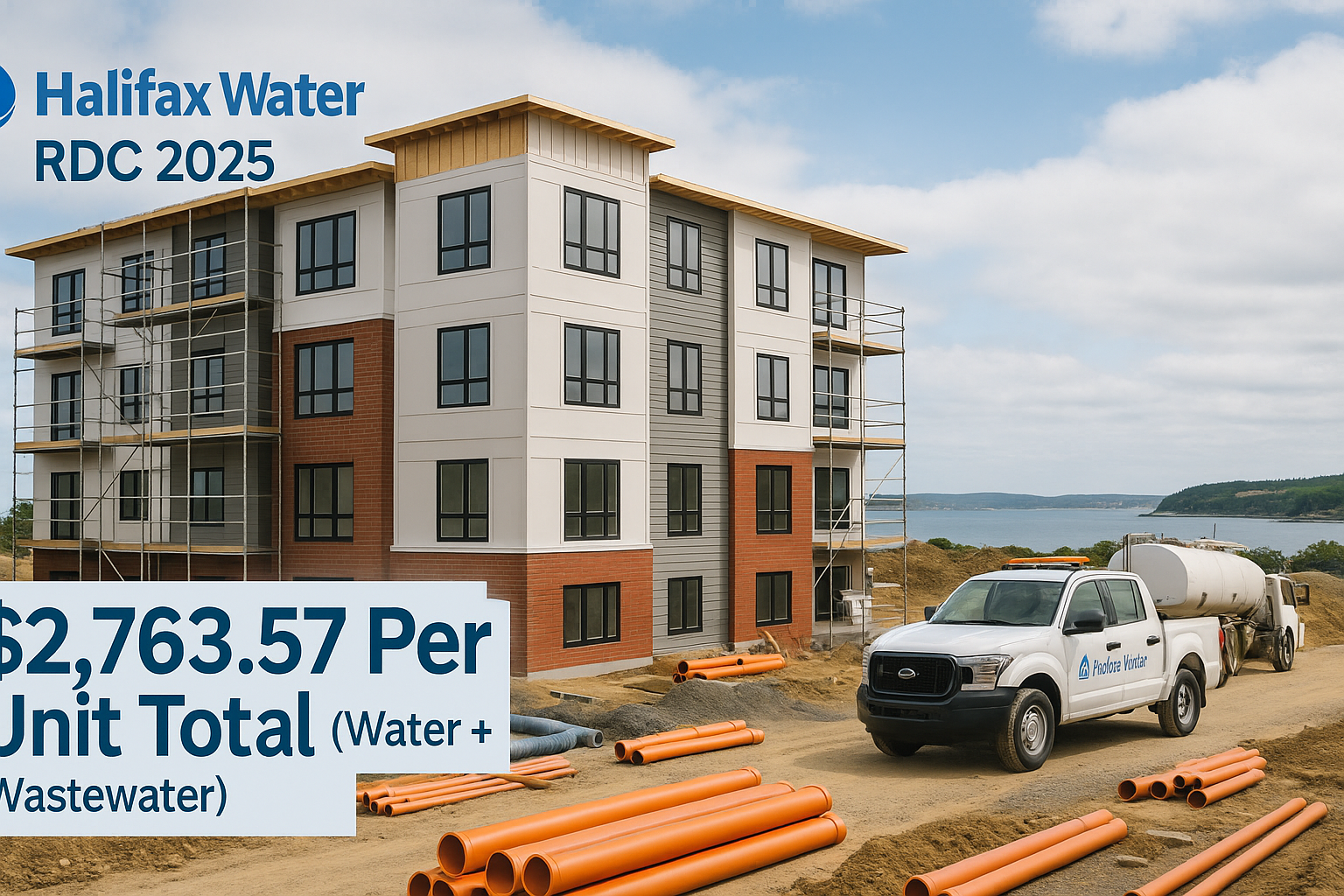Halifax Water RDC 2025: $2,763.57 Per Unit Total (Water + Wastewater)
Halifax Water’s 2025 Regional Development Charge (RDC) is set at $2,763.57 per unit, covering water and wastewater services. This fee is mandatory for connecting new developments to Halifax's water infrastructure and must be paid upfront before service activation. It significantly impacts construction budgets, especially for smaller-scale multi-unit projects.
Key Points:
- 2025 RDC Rate: $2,763.57 per unit split equally between water supply ($1,381.79) and wastewater treatment ($1,381.78).
- Multi-Unit Costs: A 4-unit project incurs $11,054.28 in RDC fees, while a 12-unit project totals $33,162.84.
- Annual Increases: RDC rates have grown by 3–5% annually due to infrastructure upgrades.
- Payment Timing: Fees must be paid during construction, creating potential cash flow challenges.
- Deferral Options: Projects with fees over $100,000 may defer 25%, repayable within two years.
For property owners, early planning and budgeting for RDC costs are critical. Developers like Helio Urban Development simplify this process by including RDC fees in fixed-price models, ensuring no surprises during construction. Delays in accounting for these fees can lead to budget overruns, financing complications, and extended timelines, affecting project ROI.
RDC Cost Components Breakdown
Water and Wastewater Cost Split
The $2,763.57 per unit Regional Development Charge (RDC) fee is divided between two critical infrastructure services managed by Halifax Water: water supply and wastewater treatment. This breakdown highlights exactly where the money is allocated and why these costs are necessary for supporting new developments.
| Service Component | Cost Per Unit | Percentage of Total |
|---|---|---|
| Water Supply | $1,381.79 | 50.0% |
| Wastewater Treatment | $1,381.78 | 50.0% |
| Total RDC Fee | $2,763.57 | 100.0% |
The fee is split equally because both systems - water distribution (including mains, pumping stations, and treatment facilities) and wastewater management (like collection systems and treatment plants) - require substantial funding. For multi-unit developments, both services must be activated together. It's not possible to connect to one without the other, making the full $2,763.57 an unavoidable cost for each unit.
This equal cost allocation reflects ongoing trends in infrastructure investment, which have steadily driven RDC rates upward over time.
How RDC Rates Have Changed Over Time
RDC rates have consistently risen over the years, largely due to increased capital investments and the rising costs of maintaining and expanding infrastructure. The current $2,763.57 per unit fee is the result of these cumulative demands.
On average, RDC rates have grown by 3-5% annually, although year-over-year changes depend on Halifax Water's specific capital projects and regulatory approvals. For instance, property owners who postponed development from 2022 to 2025 have seen RDC fees increase by several hundred dollars per unit during that period.
These rate hikes are directly tied to Halifax Water's capital spending, as the utility distributes the cost of infrastructure upgrades across all new connections. Looking ahead, further increases are likely, given the anticipated investments outlined in the Integrated Resource Plan. This plan highlights the need for ongoing upgrades to aging infrastructure, ensuring RDC rates will rise to meet future demands.
For developers planning projects beyond 2025, accounting for potential rate increases is crucial. For example, a 4-unit project facing a modest 4% rate hike would see its total RDC costs rise from $11,054.28 to $11,496.45, adding over $440 to the project budget.
These trends underscore the importance of proactive financial planning for multi-unit developments. Factoring in potential cost increases can help property owners avoid unexpected budget overruns and make informed decisions about project timelines.
How RDC Affects Multi-Unit Construction Budgets
Including RDC in Project Budgets
Halifax Water imposes a fixed, non-negotiable fee for connecting new residential units to its water and wastewater systems. For 2025, this Regional Development Charge (RDC) amounts to $2,763.57 per unit. This upfront cost is significant and must be factored into the budget of any multi-unit construction project from the very beginning.
Let’s break it down with examples: a 4-unit property would face RDC fees of $11,054.28. If you’re planning an 8-unit building, the total jumps to $22,108.56, and a 12-unit development would incur $33,162.84 in fees. These amounts highlight the importance of securing financing to cover both construction costs and the RDC fees upfront - a critical aspect of cash flow management.
Traditionally, fragmented planning approaches can result in these utility connection costs being overlooked until late in the process. However, by adopting an integrated design-build approach, these fees are addressed early in the design phase. For instance, Helio Urban Development includes RDC fees in their fixed-price construction models, which are currently set at $160,000 per unit. This transparency ensures property owners understand their total financial commitment before construction begins.
To ease cash flow challenges, Halifax Water offers a deferral program for projects where RDC fees for water or wastewater exceed $100,000. This program allows property owners to defer 25% of the respective fee, which is recorded as a tax lien and repayable within two years. This option can provide much-needed breathing room for larger developments while managing upfront costs effectively [1].
RDC Impact on ROI Calculations
Beyond initial budgeting, RDC fees have a direct impact on investment returns. These fees raise overall capital costs, which can extend payback periods and affect profitability.
Take a typical 4-unit rental property, where each unit generates between $1,950 and $2,100 in monthly gross rent. The RDC fee of $2,763.57 per unit translates to roughly 1.3 to 1.4 months of gross rental income per unit. For property owners, these figures must be carefully integrated into cash flow projections and financing strategies to maintain target returns.
The situation becomes even more complex when RDC fees are financed rather than paid upfront. For example, rolling the $11,054.28 RDC cost for a fourplex into a construction loan at 6% interest over 25 years could add approximately $71 to the project’s monthly debt service. This additional cost directly affects net operating income. Builders who incorporate RDC fees into fixed-price models can help property owners avoid such hidden financing penalties.
For investors targeting a 12–20% ROI, planning for RDC fees is crucial. Higher upfront costs may require larger down payments or increased loan amounts, potentially putting financial goals at risk if not properly accounted for.
The current RDC rate freeze, which is in place until late 2025, offers some stability for planning purposes. If Halifax Water secures funding through the Canadian Housing Infrastructure Fund, this freeze could extend until November 2026 or April 2027 [1][2]. Additionally, projects classified as affordable housing under HRM guidelines may qualify for RDC payment deferrals of up to 10 years, reducing the immediate financial burden.
Looking ahead, property owners should prepare for potential rate increases once the freeze ends. Historically, RDC rates have risen by 3–5% annually, so factoring in these adjustments into long-term financial models is essential for maintaining investment viability. By addressing these costs early - using tools like deferral programs and integrated design-build models - investors can better safeguard their ROI and ensure their projects remain financially sustainable.
How to Manage RDC Costs
Integrated Design-Build vs Traditional Construction
When it comes to handling Halifax Water RDC fees, property owners often have to choose between two approaches: a fragmented team setup or an integrated design-build model. The traditional route, which involves separate coordination with architects, engineers, contractors, and permit specialists, can lead to RDC fees being discovered late in the process. This delay often results in budget overruns, cash flow issues, or even project delays as owners scramble to secure additional financing.
Helio Urban Development takes a different approach. Their model integrates RDC planning right from the start, ensuring no surprises later. With a fixed-price construction cost of $160,000 per unit, their service includes RDC coordination as part of the package. This means the $2,763.57 per unit RDC fee is accounted for during the initial planning stages, eliminating unexpected costs during the permit phase.
| Fragmented Approach | Integrated Approach |
|---|---|
| RDC fees uncovered during permit stage | RDC fees included in early budget planning |
| Multiple contractors with divided accountability | One company manages all RDC coordination |
| Budget overruns of 30–60% | Fixed-price guarantee with no surprises |
| Construction timelines of 12–18 months | Guaranteed 6-month completion |
| Coordination across 6+ professionals | Single point of contact for the entire project |
| Guesswork for utility connections | Systematic RDC planning and timing |
By bringing architects, engineers, and construction teams together from the beginning, the integrated approach reduces coordination headaches, optimizes designs to lower RDC impacts, and ensures permits are secured on time. This method not only avoids surprise costs but also streamlines the entire process, with local incentives further easing the financial burden of RDC fees.
Deferral Programs and Local Incentives
In addition to integrated planning, property owners can take advantage of several local programs designed to provide immediate financial relief for RDC costs. For example, the Province of Nova Scotia’s Second Unit Incentive Program (SUIP) offers a Halifax Water Fees Grant of up to $2,762.96 to cover RDC charges for secondary units, along with an additional $150 for inspection fees on backyard suites [3]. Furthermore, owners may qualify for a Water & Wastewater Infrastructure Grant of up to $10,000 to help with new water and sewer connections [3].
Affordable housing projects benefit even more. Developments classified under HRM’s affordable housing guidelines can defer RDC payments for up to 10 years [1], significantly improving cash flow and making these projects more financially manageable.
Adding to this, the current RDC rate freeze provides much-needed stability for planning. Rates are locked at 2023 levels until late 2025, and if Halifax Water secures funding from the Canadian Housing Infrastructure Fund, this freeze could extend until November 2026 or even April 2027 [2]. When combined with municipal and provincial initiatives like the Secondary and Backyard Suite Incentive Program, property owners have several options to reduce the overall cost of RDC fees for eligible projects.
sbb-itb-16b8a48
Integrated Design-Build Solutions for RDC Cost Management
Helio Urban Development's Construction Method

Helio Urban Development has developed a streamlined system to handle Regional Development Charges (RDC) for multi-unit projects, helping property owners avoid unexpected costs that can derail budgets. As the only integrated design-build company in Nova Scotia specializing in rental properties with four or more units, Helio tackles the coordination challenges that often result in surprise RDC fees during the permitting process.
Their approach is built around fixed-price construction, set at $160,000 per unit, with a guaranteed six-month completion timeline. This includes the $2,763.57 RDC fee as part of the upfront budget. Helio’s co-founder and CEO, Lloyd Liu, assures clients:
I personally guarantee every timeline, drawing from firsthand experience with delays.
What makes Helio stand out is its fully integrated approach to RDC planning. Instead of requiring property owners to juggle architects, engineers, and contractors - often leading to miscommunication - Helio’s in-house team manages all aspects of RDC coordination. Yuan He, the company’s co-founder and CTO, has created a scheduling system that prevents delays, ensuring projects don’t stretch beyond the planned six months.
Currently, Helio has 31 units under construction across Nova Scotia, with another 131 in the planning phase. Their reach extends to property owners within a 90-minute radius of Halifax. To maintain transparency, Helio provides daily photo updates through a real-time project portal, keeping clients informed throughout the construction process.
Financial Benefits for Property Owners
Helio's integrated model offers tangible financial savings for property owners. By avoiding the 30–60% budget overruns common with separately managed construction teams, property owners save an estimated $47,000 per project. These savings stem from eliminating inefficiencies and miscommunication between independent professionals.
The six-month construction guarantee offers additional financial security. If Helio misses its deadline, they pay penalties of up to $1,000 per day directly to the property owner. With rental units generating between $1,950 and $2,100 per month, a four-unit property can start earning approximately $8,000 in monthly revenue as soon as construction is complete.
For those opting for Helio’s CMHC MLI Select Construction package at $200,000 per unit, the benefits extend further. This option focuses on energy efficiency, producing units that are 40% more energy-efficient than required by standard building codes. These upgrades qualify property owners for 95% financing with only 5% down, along with a 50-year amortization. This financing structure offers a leverage ratio of 20:1, compared to the traditional 5:1.
Helio also offers a Premium Rental Ready Package for an additional $15,000 per unit. This package includes bulk pricing on appliances and smart home technology, saving owners over $3,000 per unit. It also eliminates the typical 60-day delay between construction completion and tenant move-in, allowing owners to start collecting rent immediately.
4-Unit Project Example with Helio
Here’s how Helio’s integrated design-build method simplifies costs and speeds up project timelines. For a four-unit project, the base construction cost is $640,000 ($160,000 per unit), with RDC fees of $2,763.57 per unit adding $11,054.28 to the total.
Helio guarantees a six-month timeline from groundbreaking to completion, compared to the industry standard of 12–18 months. With each unit renting for $2,000 per month, property owners begin earning $8,000 in monthly revenue by month seven. Over the first year of full operation, this generates $96,000 in rental income, supporting an annual return on investment (ROI) of 12–20%.
Helio’s team takes care of all RDC coordination with Halifax Water, ensuring permits are secured on time. This eliminates delays often caused by fragmented teams. The project is backed by a two-year warranty and undergoes five inspections by professional engineers (P.Eng) during construction to meet bank-grade quality standards.
Regional Development Charge Workshops 3 & 4 - Financial Assumptions & Application of the Charge
Key Points About Halifax Water RDC 2025

Managing the $2,763.57 per unit RDC fee is a crucial part of budgeting for multi-unit projects. This fee becomes even more impactful when you compare it to the inefficiencies often seen with traditional construction methods.
Traditional construction can lead to delays and unexpected costs due to poor coordination among different teams. By contrast, the integrated design-build method simplifies RDC cost management by assigning a single point of accountability. This approach ensures that RDC fees are factored in from the start, avoiding the chaos of last-minute adjustments. Helio Urban Development exemplifies this strategy, integrating RDC coordination seamlessly into their process from the very beginning.
For a four-unit project, the total RDC cost is $11,054.28, and fixed-price construction models make this cost predictable and manageable. Helio Urban Development takes this a step further by including RDC coordination in their fixed pricing of $160,000 per unit. This upfront planning eliminates the risk of unexpected change orders and delays, which are all too common in traditional projects when RDC fees aren’t accounted for early on.
The financial impact of RDC management goes beyond the fee itself. Delays in coordination can stretch construction timelines from six months to 12–18 months, leading to significant losses in rental income. For instance, if four units could generate around $8,000 per month, a six-month delay could cost property owners approximately $48,000 in lost revenue - a figure that dwarfs the RDC fee.
FAQs
How do rising Halifax Water RDC rates affect construction project budgets over time?
Rising Halifax Water Regional Development Charges (RDC) are becoming a key factor in construction budgets, especially for multi-unit residential projects. For 2025, the RDC is set at $2,763.57 per unit, with notable increases of 16.2% in 2025/26 and 17.6% in 2026/27. These escalating fees can add thousands of dollars to project costs, directly affecting feasibility, profitability, and overall return on investment (ROI).
To navigate these rising expenses, it’s essential to integrate them into your financial planning early in the project. A well-organized budgeting strategy allows property owners to anticipate these charges, minimizing the risk of unexpected costs. This proactive approach supports a smoother construction process and helps secure better long-term financial results.
How does an integrated design-build approach help reduce RDC costs for multi-unit developments in Halifax?
An integrated design-build approach brings together the design and construction phases under one unified team, making it easier to handle Regional Development Charges (RDC). This approach helps reduce delays, miscommunication, and costly change orders, keeping projects on track and within budget.
With its focus on cost predictability and a more efficient process, this method cuts down on unexpected expenses that often arise with traditional project management. It also ensures better accountability and smoother execution, giving property owners in Halifax a clearer path to managing RDC costs as they plan multi-unit developments.
What options are available to help property owners in Halifax manage upfront RDC costs?
Property owners in Halifax have access to deferral programs designed to ease the financial strain of the Regional Development Charge (RDC). These programs allow payments to be postponed for as long as 10 years, often without accruing interest - especially for affordable housing initiatives. This can be a game-changer during the early phases of development when budgets are often tight.
On top of that, there are local incentives available, like grants of up to $12,900 for first-time secondary unit owners who live on-site. These grants can help cover the upfront costs of building secondary rental units, making smaller multi-unit projects more financially manageable.
By tapping into these resources, property owners can reduce initial expenses and make their developments more financially viable.
